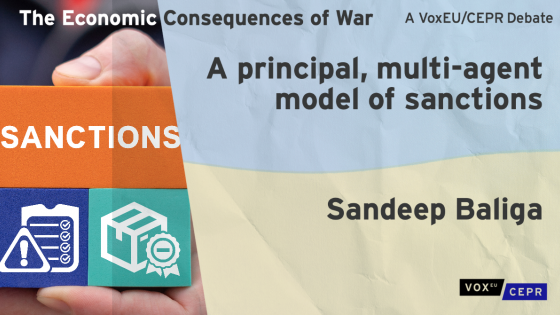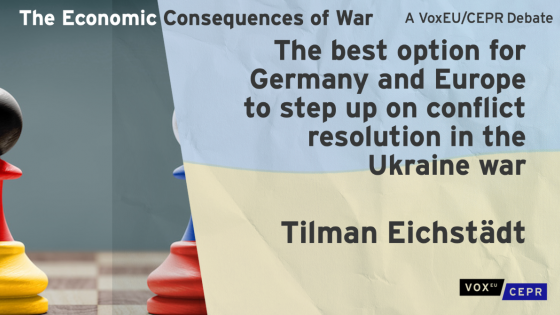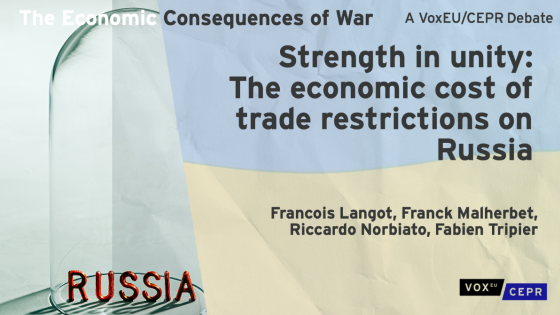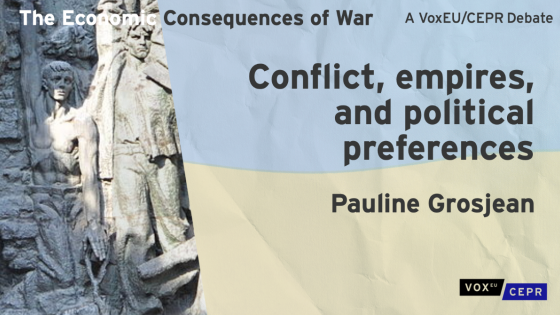Editors' note: This column is part of the Vox debate on the economic consequences of war.
Russia's invasion of Ukraine has been met with sanctions that target President Putin, his family, members of his inner circle, and oligarchs who control key Russian industries. Assets of the Russian elite, held in the form of property and financial holdings in the West, have been confiscated. In addition, the US, Europe and their allies have cut the Russian financial system off from international difficulties for the ruble to collapse and triggering bank runs. These sanctions affect the Russian population at large.
The US has frequently imposed comprehensive economic sanctions (e.g. trade embargoes) on countries that are perceived as threats against international peace and stability. More recently, there has been a push towards targeted sanctions (blocking the elite's financial assets and transactions, restricting their ability to travel and to consume luxury goods, etc.). The recent sanctions against Russia have both targeted and comprehensive components. Similar strategies have been pursued in the past against Iran and North Korea. By contrast, South Africa, Iraq, and Libya faced mainly comprehensive sanctions. After the collapse of the Soviet Union, Russia used comprehensive sanctions against the newly independent states which relied on Russia to export their products or import energy and other inputs.
In this column, I study the effectiveness of sanctions in changing the sanctioned country’s behaviour. I will contrast measures that impose costs on the population as a whole (comprehensive sanctions) with measures that target the elite (‘smart’ or targeted sanctions). I will not discuss the costs on the sanctioner because we can rely on the analyses of others. Will sanctions unite or divide the population and the elite in the sanctioned country? What is the optimal mix of targeted and comprehensive sanctions? Do these different types of sanctions work with or against each other?
Model
A major power – the ‘principal’ (she) – uses targeted sanctions to incentivise the political elite – the ‘agent’ (he) – to change course by directly impacting their cost-benefit analysis. The principal imposes comprehensive sanctions on citizens for an indirect purpose: to cause social and popular unrest, which either destabilises the regime or forces it to change course.
The success of both types of sanctions depends on the agent’s and citizens’ beliefs about the preferences of the principal. Is the principal a ‘dove’ who will live in perhaps uneasy coexistence with the agent and citizens if there is cooperation? Or is the principal an imperialist who will use cooperation to further advance an even more coercive agenda?
This uncertainty is often ignored in policy circles, assuming it is common knowledge that the principal’s motives are benign. But if the US and its allies are thought to be pushing for regime change, targeted sanctions will be ineffective as the elite face ejection from power or worse. If the allies are thought to be out to immiserate the country and extract its resources, comprehensive sanctions will be ineffective as citizens face economic catastrophe. In fact, if the principal is believed to be an imperialist because of sanctions, they cause a ‘rally round the flag’ effect, unifying citizens and the political elite.
Therefore, sanctions must satisfy three conditions. First, cooperation must be defined clearly. If cooperation is not clearly defined, the agent and citizens do not know what must be done to have sanctions removed. Second, the principal must commit to removing sanctions if this acceptable standard of behaviour is met. If sanctions are never removed, they do not create marginal incentives for the agent to cooperate or for citizens to impose political pressure on the agent. Third, the principal must signal that she is a dove not an imperialist to minimise the rally round the flag effect, though others will always have the suspicion that she is bluffing.
Analysis
Comprehensive sanctions are more likely to work if citizens’ social pressure has a significant impact on the agent’s political future. Such pressure is more likely to operate in near democracies than in autocracies where there is a repressive security apparatus. But citizen unrest risks replacing the agent with another leader who cooperates but against an imperialist principal. Therefore, the optimal sanctions policy involves maximising comprehensive sanctions in near democracies when the probability that the principal is an imperialist is low (Baliga and Sjöström 2022).
Many years of comprehensive sanctions against South Africa did lead to the end of apartheid. The white electorate in South Africa could effectively exert pressure on politicians and democratisation opened up the possibility of a peace dividend, not foreign hegemony. But decades of comprehensive sanctions have not led to significant change in Iran, Cuba, or North Korea. As for Russia, there is little chance popular that unrest will be successful and there is fear of what will happen if they do cooperate. Hence, comprehensive sanctions will not be effective in persuading Russia to end its invasion of Ukraine.
This means targeted sanctions are the optimal policy in the case of Russia (Baliga and Sjöström 2022). The West and its allies should maximise targeted sanctions to maximise the chance of compelling the agent to cooperate. The agent derives a private benefit from the ‘strength’ projected by non-cooperation. For example, Russia's president may take credit for restoring part of the Soviet empire. Because of the private benefit, the agent’s incentives are not perfectly aligned with those of citizens or the principal. Maximising targeted sanctions carries the most hope for overcoming private benefits from non-cooperation. But recall the agent will never cooperate with a principal who is likely to be an imperialist. This means the principal has to make clear that regime change is not an objective.
Paradoxically, high targeted sanctions make comprehensive sanctions less effective by triggering a rally round the flag effect. If the agent does not capitulate to the demands of the principal, citizens deduce this might be because the principal is an imperialist, not a dove. So, they are even less likely to revolt. Since comprehensive sanctions are then even more unlikely to work, it is even more important to ensure targeted sanctions are aimed correctly.
Seizing the assets and curtailing the freedoms of Russian politicians in the Duma and in the Cabinet targets elite decision-makers. Sanctions that limit the financial transactions of President Putin’s inner circle also targets the elite. There are a set of siloviki, or 'hard men', who are at the centre of decision-making (Lieven 2022). Many of them have children who live or study in the West. One of them, Igor Sechin, is the head of Rosneft, an oil and gas exporter. This means targeted sanctions should focus on the Russian energy exports, as the associated companies are controlled by siloviki. Also, the profits from energy industries fuel the Russian state and its war.
My co-author’s and my focus in (Baliga and Sjöström 2022) is on how to maximise the benefits of sanctions to the principal. We argue that the principal (Europe, the US and their allies) should impose costs on the agent (the Russian elite) in the form of targeted sanctions as comprehensive sanctions are likely to be ineffective. The ideal targeted sanctions are on Russian exports of oil and gas. Unpalatable as it may be, for these sanctions to be successful, there must be a commitment to dropping them if Russia cooperates (where cooperation is clearly defined). But Berner et al. (2022) point out that Russian energy sector banks have not been sanctioned at all and trade in Russian oil and gas continues.
This is because such sanctions impose costs on the principal as well as the agent. But Bachmann et al. (2022) estimate the macroeconomic impact to Germany of cutting out Russian energy exports and show it is smaller than thought. Hosoi and Johnson (2022) argue that transport of oil should be monitored, any Russian revenue should only be handed over only when the war ends, and trade should only be allowed with special permits. Sturm (2022) shows that tariff revenue can make up for some of the welfare losses and might even make Germany better off. Targeting fossil fuels helps the environment in the long run (Chepeliev et al. 2022).
To summarise, in an autocratic state, comprehensive sanctions are unlikely to work as the state can suppress citizen dissent. This makes targeted sanctions the main viable instrument and in Russia this implies sanctioning energy exports. This can be done in ways that minimises costs on the principal and even generates revenue (Gros 2022, Strum 2022).
References
Bachmann, R, D Baqaee, C Bayer, M Kuhn, A Löschel, B Moll, A Peichl, K Pittel and M Schularick (2022), “What if Germany is cut off from Russian energy?”, VoxEU.org, 25 March.
Baliga, S and T Sjöström (2022), “Optimal Sanctions, mimeo, Northwestern University.
Berner, R, S Cecchetti and K Schoenholtz (2002), “Russian sanctions: Some questions and answers”, VoxEU.org, 21 March.
Chepeliev, M, T Hertel, and D van der Mensbrugghe (2022), “Cutting Russia’s fossil fuel exports: Short-term pain for long-term gain”, VoxEU.org, 09 March.
Gros, D (2022), “How to solve Europe’s Russian gas conundrum with a tariff”, VoxEU.org, 30 March.
Hosoi, A and S Johnson (2022), “How to implement an EU embargo on Russian oil”, VoxEU.org, 20 April.
Lieven, A (2022), “Inside Putin’s Inner Circle – the Real Russian Elite,” Financial Times, 10 March.
Sturm, J (2022), “The Simple Economics of a Tariff on Russian Energy Imports”, VoxEU.org, 13 April.



